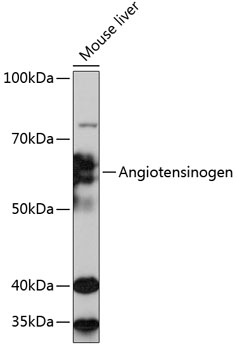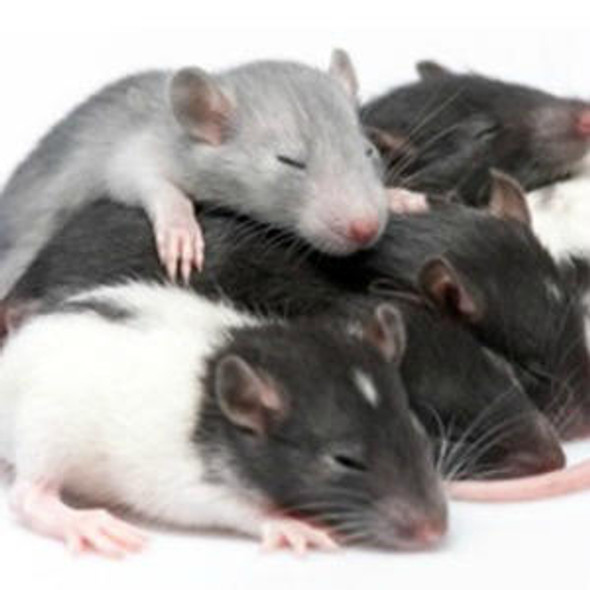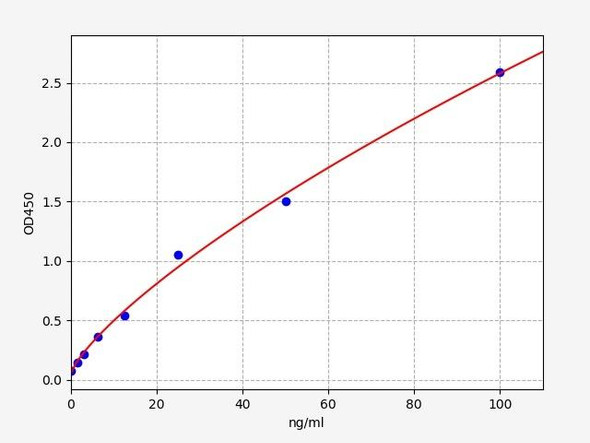Anti-Angiotensinogen Antibody (CAB11689)
- SKU:
- CAB11689
- Product type:
- Antibody
- Reactivity:
- Human
- Mouse
- Rat
- Host Species:
- Rabbit
- Isotype:
- IgG
- Antibody Type:
- Monoclonal Antibody
- Research Area:
- Cell Biology
Description
| Antibody Name: | Anti-Angiotensinogen Antibody |
| Antibody SKU: | CAB11689 |
| Antibody Size: | 20uL, 50uL, 100uL |
| Application: | WB |
| Reactivity: | Human, Mouse, Rat |
| Host Species: | Rabbit |
| Immunogen: | A synthesized peptide derived from human Angiotensinogen |
| Application: | WB |
| Recommended Dilution: | WB 1:500 - 1:2000 |
| Reactivity: | Human, Mouse, Rat |
| Positive Samples: | Mouse liver, Human plasma, Rat plasma |
| Immunogen: | A synthesized peptide derived from human Angiotensinogen |
| Purification Method: | Affinity purification |
| Storage Buffer: | Store at -20°C. Avoid freeze / thaw cycles. Buffer: PBS with 0.02% sodium azide, 0.05% BSA, 50% glycerol, pH7.3. |
| Isotype: | IgG |
| Sequence: | Email for sequence |
| Gene ID: | 183 |
| Uniprot: | P01019 |
| Cellular Location: | |
| Calculated MW: | 53-64kDa |
| Observed MW: | 60KDa |
| Synonyms: | ANHU, SERPINA8 |
| Background: | The protein encoded by this gene, pre-angiotensinogen or angiotensinogen precursor, is expressed in the liver and is cleaved by the enzyme renin in response to lowered blood pressure. The resulting product, angiotensin I, is then cleaved by angiotensin converting enzyme (ACE) to generate the physiologically active enzyme angiotensin II. The protein is involved in maintaining blood pressure and in the pathogenesis of essential hypertension and preeclampsia. Mutations in this gene are associated with susceptibility to essential hypertension, and can cause renal tubular dysgenesis, a severe disorder of renal tubular development. Defects in this gene have also been associated with non-familial structural atrial fibrillation, and inflammatory bowel disease. [provided by RefSeq, Jul 2008] |
| UniProt Protein Function: | angiotensin: Essential component of the renin-angiotensin system (RAS), a potent regulator of blood pressure, body fluid and electrolyte homeostasis. In response to lowered blood pressure, the enzyme renin cleaves angiotensinogen to produce angiotensin-1 (angiotensin 1-10). Angiotensin-1 is a substrate of ACE (angiotensin converting enzyme) that removes a dipeptide to yield the physiologically active peptide angiotensin-2 (angiotensin 1- 8). Angiotensin-1 and angiotensin-2 can be further processed to generate angiotensin-3 (angiotensin 2-8), angiotensin-4 (angiotensin 3-8). Angiotensin 1-7 is cleaved from angiotensin-2 by ACE2 or from angiotensin-1 by MME (neprilysin). Angiotensin 1-9 is cleaved from angiotensin-1 by ACE2. Genetic variations in AGT are a cause of susceptibility to essential hypertension (EHT). Essential hypertension is a condition in which blood pressure is consistently higher than normal with no identifiable cause. Defects in AGT are a cause of renal tubular dysgenesis (RTD). RTD is an autosomal recessive severe disorder of renal tubular development characterized by persistent fetal anuria and perinatal death, probably due to pulmonary hypoplasia from early-onset oligohydramnios (the Potter phenotype). Belongs to the serpin family. |
| UniProt Protein Details: | Protein type:Secreted, signal peptide; Secreted Chromosomal Location of Human Ortholog: 1q42.2 Cellular Component: extracellular region; extracellular space Molecular Function:growth factor activity; hormone activity; protein binding; serine-type endopeptidase inhibitor activity; type 1 angiotensin receptor binding; type 2 angiotensin receptor binding Biological Process: activation of NF-kappaB transcription factor; angiotensin maturation; blood vessel remodeling; cell-cell signaling; G-protein coupled receptor protein signaling pathway; G-protein signaling, coupled to cGMP nucleotide second messenger; kidney development; negative regulation of nerve growth factor receptor signaling pathway; nitric oxide mediated signal transduction; positive regulation of cellular protein metabolic process; positive regulation of cytokine production; positive regulation of epidermal growth factor receptor signaling pathway; positive regulation of fibroblast proliferation; positive regulation of inflammatory response; positive regulation of NAD(P)H oxidase activity; positive regulation of peptidyl-tyrosine phosphorylation; positive regulation of phosphoinositide 3-kinase cascade; positive regulation of transcription, DNA-dependent; regulation of blood pressure; renal system process; renin-angiotensin regulation of blood vessel size; response to muscle activity involved in regulation of muscle adaptation Disease: Hypertension, Essential; Renal Tubular Dysgenesis |
| NCBI Summary: | The protein encoded by this gene, pre-angiotensinogen or angiotensinogen precursor, is expressed in the liver and is cleaved by the enzyme renin in response to lowered blood pressure. The resulting product, angiotensin I, is then cleaved by angiotensin converting enzyme (ACE) to generate the physiologically active enzyme angiotensin II. The protein is involved in maintaining blood pressure and in the pathogenesis of essential hypertension and preeclampsia. Mutations in this gene are associated with susceptibility to essential hypertension, and can cause renal tubular dysgenesis, a severe disorder of renal tubular development. Defects in this gene have also been associated with non-familial structural atrial fibrillation, and inflammatory bowel disease. [provided by RefSeq, Jul 2008] |
| UniProt Code: | P01019 |
| NCBI GenInfo Identifier: | 113880 |
| NCBI Gene ID: | 183 |
| NCBI Accession: | P01019.1 |
| UniProt Secondary Accession: | P01019,Q16358, Q16359, Q96F91, |
| UniProt Related Accession: | P01019 |
| Molecular Weight: | 53,154 Da |
| NCBI Full Name: | Angiotensinogen |
| NCBI Synonym Full Names: | angiotensinogen |
| NCBI Official Symbol: | AGT |
| NCBI Official Synonym Symbols: | ANHU; SERPINA8 |
| NCBI Protein Information: | angiotensinogen |
| UniProt Protein Name: | Angiotensinogen |
| UniProt Synonym Protein Names: | Serpin A8 |
| Protein Family: | Angiotensinogen |
| UniProt Gene Name: | AGT |
| UniProt Entry Name: | ANGT_HUMAN |











